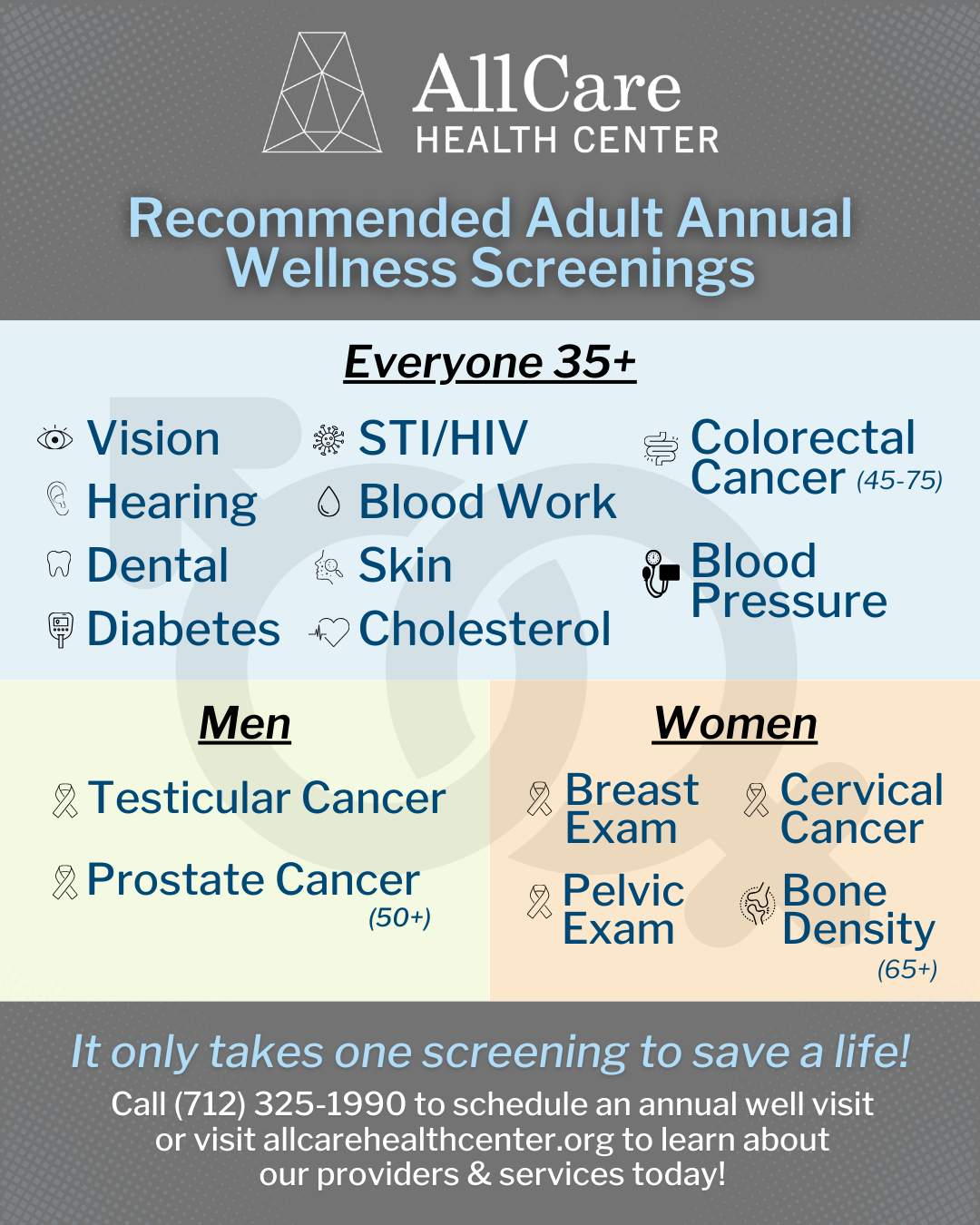Spoken from the Heart: You should be alarmed.
I recently read a statistic that only 8% of adults over 35 are up-to-date on their recommended clinical screenings. You would think that everyone was living a happy and healthy life. However, in our society, people are dying from cancer, heart disease, diabetes, and obesity complications every single day. Why are we not alarmed?
If I didn’t work in healthcare, I might not know when I needed each of these screenings; I may be like the countless other Iowans who don’t go to the doctor unless something has hurt for too long. I will admit I often power through my aches and pains, even though I should not. However, I know that if I regularly see my provider, they will keep me on track. It’s really that simple. All I need to do is schedule an annual well visit.

We’re pretty good about getting our kids in when they are infants for their exams and vaccinations, but at some point, the majority of us (as statistics dictate) fall off the preventative healthcare wagon. Preventative healthcare includes a carefully timed set of services that screen and sometimes identify health issues before symptoms develop. Screenings can point out heart disease, diabetes, and an array of cancers. They can easily detect high blood pressure and high cholesterol. Health screenings can help you live a longer and more robust life. Sometimes, a “cure” is possible through provider-recommended preventative counseling in the form of lifestyle changes. Most insurance plans cover the full cost of preventative healthcare services with no co-pays.
Mortality rates in southwest Iowa are higher than not only the state average but also the national average. Pottawattamie County’s health outcome score, as determined by the Robert Wood Johnson Foundation, ranks us at 95 out of 99 counties in Iowa. This means only four counties have worse health outcomes, and one is our neighbor – Montgomery County. There are schools of thought that point to individuals of southwest Iowa being exceptionally resilient. Our rural generations grew up working hard and caring for the land. Nothing got in their way, not aches, pains, or illness.
My dad died at age 74 from complications surrounding heart disease and diabetes. I wonder how long he went through his days “not feeling well” until he was diagnosed with diabetes. I wonder if he simply didn’t know what it felt like to feel good. I’m pretty sure when the heart attacks started, he was seeking emergency care, but was it too late to start getting care, then? Was he one of those proud men who was not going to let an ache or pain inconvenience his daily farming routine? I believe he was.
It’s not just the older generations waiting to seek preventative healthcare. It can happen at any age. A good friend of mine recently illustrated this resilience (or maybe stubbornness). She has four active children, works full-time, and manages her family’s livestock operations. For years, she has not prioritized care for herself, just her family and farm. She waited until age 50 to get her first mammogram, where she was diagnosed with stage 2 breast cancer.
A lack of access to health care is a real concern – it is a health emergency. For our communities of southwest Iowa, healthcare must be of the utmost convenience to take time to seek the care they need. No one wants to wait for an available appointment or has the means to travel a long distance. It also has to be affordable. And folks may need a little convincing, too. This is what makes All Care Health Center perfect for “the job.” All Care is focused on increasing access to care. Increasing access to care is our strategic plan’s number one high-level initiative. Increasing access to care can mean many things. This can mean opening new doors in communities that lack any healthcare resources. It can mean sending our mobile medical clinic to local schools, expanding transportation resources, or helping rural residents understand how to use telehealth. It can even mean connecting care coordinators with folks who have never scheduled an annual exam. All Care is weighing a lot of options. Expect to see change for the better, one step at a time.
We are past New Year’s resolution season, but there is always time to set a goal. If you are part of the 92% who have not had an annual wellness visit in the last year, please take some time and schedule an appointment with your primary care provider. Then, commit to this annually; consider adding an annual scheduling reminder to your calendar.
Do you need to establish a primary care provider? All Care can help. Establish care with us. We will see you soon so you can live a long, happy, and HEALTHY life.
